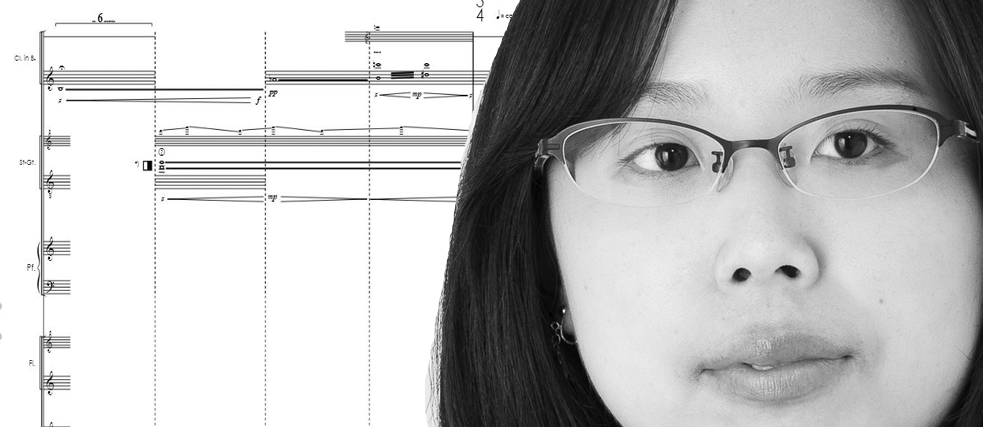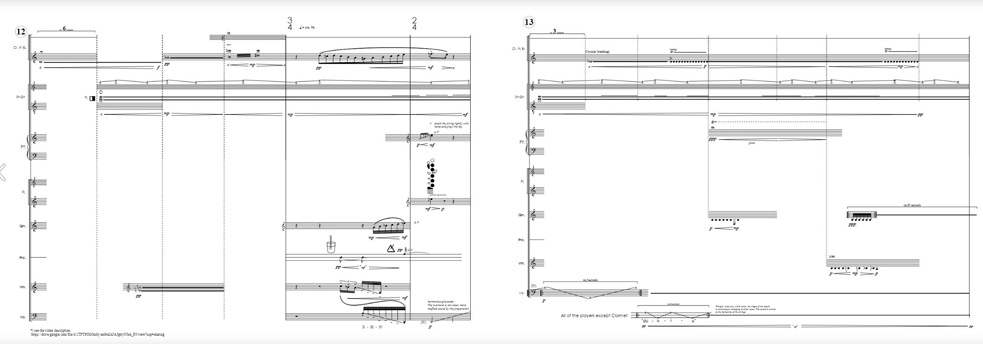Yukiko Watanabe
The Composer of Noises

The Japanese-German composer Yukiko Watanabe has been working with Japanese pianist Kimihiro Yasaka as part of her residency for new music in Montreal in autumn 2019. During their rehearsals at the Goethe-Institut Montreal we had the opportunity to ask Yukiko a few questions about her work and her career.
By Webredaktion Goethe-Institut Montreal
The residency for new music, which the Goethe-Institut Montreal awards in collaboration with the Conseil des arts et des lettres du Québec and the group Le Vivier, went to Japanese-German composer Yukiko Watanabe in 2019. Yukiko first studied composition and piano at the Toho Gakuen School of Music and moved to Graz in 2008, where she studied with composer and conductor Beat Furrer at the Kunstuniversität Graz. In 2014 she moved to Cologne, where she continued her studies at the Hochschule für Musik under Johannes Schöllhorn. During her rehearsals at the Goethe-Institut Montreal we had the opportunity to ask her a few questions about her work and career.
I wouldn't say that I compose "experimental music". I compose music, but I don't really know what I would call it.
Yukiko Watanabe
Above all, it is important for me to be able to think intuitively. For me, this means not only spontaneously or automatically, but also logically. This logic is based on various experiences - what I have heard, eaten, read, with whom I have met, everything I have experienced. This is how I begin to think music, out of my daily life. For example, I wrote a piece on the subject of garbage. Not far from my apartment there is a garbage processing plant, and when I pass by on the train, I am fascinated by the ever new irregular colours and textures of the raw material waiting to be processed.
 Excerpt from the partition to "Aqua Houses“
| © Yukiko Watanabe
Do your compositions have themes or are all decisions of a musical nature? Are pieces like "Fanfare für Straßenbau" reactions to your environment or do they tell a story?
Excerpt from the partition to "Aqua Houses“
| © Yukiko Watanabe
Do your compositions have themes or are all decisions of a musical nature? Are pieces like "Fanfare für Straßenbau" reactions to your environment or do they tell a story?Sound is a big issue for me, and the question of how I can use everyday sounds in my music. In general it is a fascinating thought to understand environmental sounds like wind or water as music. But in our modern society, sounds have many meanings. For example, I find the honking of cars or the sound of the garbage processing plant exciting. It is an interesting question why I like these sounds even though they are not objectively "beautiful" noises. The piece "Fanfare für Strassenbau" deals with the topic of car horns.
How did you become involved with music? And what led you to composition?
I started playing the piano as a young child, because my mother is a piano teacher. And from the very beginning I liked improvising and had a great interest in composing, so I started early, I think at the age of 9 or 10. My first composition teacher was Keiko Harada, who is a very big influence for me. I studied with her in Japan for more than 10 years before moving to Europe in 2008 to continue my studies.
Have you always been interested in experimental music and are there other music styles that influence you?
Because I learned piano in the beginning, I like classical music like Beethoven, Mozart, Debussy, Schubert. But in my youth I played jazz orchestras like Schlagwerk or composed pop songs together with friends. I think all these different things I have done are reflected in my compositions. I wouldn't say that I compose "experimental music". I compose music, but I don't really know what I would call it.
Do you have role models or important influences?
Michiko Toyama. The Japanese composer was born in 1913 and died in 2006. She belonged to the first generation of Japanese composers to study abroad. She was very active as a mother and as a composer, but did not become very well known in Japan. Through her, however, I learned that reconciling family and career as a composer is not easy, but possible!
Is music/harmony theory a topic for you, or do you move outside theoretical considerations? In jazz, for example, it can be hard to ignore theory because improvisation takes place together with others. This is not always the case in new music and in your case. Would you consider yourself freer because of that?
All knowledge flows into one's own creations, not just music theory and harmony. You don't know what is important and what isn't - I think you have to deal with many things, even if they have nothing to do with music. I learned music theory and harmony a long time ago on my own initiative and at school before I realized how important it is. But today I know that the theories and thoughts of the past are valuable inventions that can still be relevant for my work today.
How do you like Montreal? Have you already found time to see the city outside of work?
It's beautiful! I really like Montreal a lot. There are a lot of different cultures here that coexist peacefully in the city. I think that's really great.
Yukiko Watanabe and the Japanese pianist Kimihiro Yasaka will present the results of the Music Residence 2019 on 14 December 2019 at 17:30 at the Goethe-Institut Montreal. More information here.
Comments
Comment